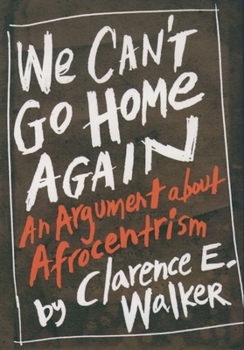We Can't Go Home Again: An Argument about Afrocentrism
Afrocentrism has been a controversial but popular movement in schools and universities across America, as well as in black communities. But in We Can't Go Home Again, historian Clarence E. Walker puts Afrocentrism to the acid test, in a thoughtful, passionate, and often blisteringly funny analysis that melts away the pretensions of this "therapeutic mythology."
As expounded by Molefi Kete Asante, Yosef Ben-Jochannan, and others, Afrocentrism...
Format:Hardcover
Language:English
ISBN:0195095715
ISBN13:9780195095715
Release Date:June 2001
Publisher:Oxford University Press, USA
Length:208 Pages
Weight:0.90 lbs.
Dimensions:0.9" x 5.8" x 8.7"
Customer Reviews
4 ratings
A good book that shows the flaws in Afrocentrism
Published by Thriftbooks.com User , 21 years ago
A very good book! It has a few minor flaws in developing its argument but in the end ... its conclusion is undeniable, Afrocentrism is not based as much on historical fact as it is based on politics.
Examining Afrocentrism's Egyptian branch
Published by Thriftbooks.com User , 22 years ago
"Nonsense" is one of Clarence Walker's favorite words in this scathing critique of Afrocentrist discourse, which focuses on the attempt to reclaim Egypt as a seat of Black culture. It is not, in fact, a conservative analysis; most of the usual right-wing suspects will run screaming from this book, which comes down hard on the pro-affirmative action side, savages what Walker sees as a return to "free market racism" (85), and drubs the homophobia shared by some black leaders and their purported opponents. (In a footnote, Walker bluntly describes Dinesh D'Souza's _The End of Racism_ as itself "racist.") Walker's project might be described thusly: he subverts central Afrocentrist tenets about race, culture, and historical origins by demonstrating that most of these supposedly critical arguments actually derive from outmoded European beliefs. Most seriously, he shows how Afrocentric ideas of race borrow from the newly "scientific" racism of the mid- and late-19th century. Elsewhere, he catalogs ludicrous errors in Afrocentric history texts; examines methodological problems in Afrocentric research on Egypt; and attacks the anti-Semitism he sees endemic to some strands of this discourse. He also argues that Afrocentrism finds itself unable to deal with American slavery, a problem that is an artifact of one of the most serious problems with Afrocentrism as a disciplinary approach: it seems incapable of engaging in dialogue with "mainstream" scholarship.This is an exasperated book. Walker has no patience with those who define "blackness" by one's willingness to toe a particular intellectual and political line. He is equally irritated with what he describes as the "therapeutic" trend in Afrocentrist historiography, which substitutes psychological uplift for the complexities of historical study. His use of the word "Negro" is political, since he sees nothing particularly "African" about "African-Americans." (As Walker points out, many Africans refuse to consider African-Americans "one of them.") Since Walker is writing a jeremiad and not an in-depth analysis of Afrocentrism's own history (see, e.g., Wilson Moses' _Afrotopia_), the book occasionally irons out difficulties and lumps when it ought to split. In particular, it is not always clear that Walker himself understands the particularities of contemporary Egyptology. The book hardly constitutes an assault on the study of Black history, however; it is, rather, a plea for a Black history written without romantic blinkers on.
Excellent review of Afrocentrist nonsense by a real scholar
Published by Thriftbooks.com User , 22 years ago
Mary Lefkowitz is quoted on the cover as saying if you read only one book on Afrocentrism, this should be the one. I think that hers is actually better, but this is an excellent polemic written by a real scholar - as opposed to Asante, Diop, the below mentioned "doctoral student" whose "research" is laughable at best, and other purveyors of poorly reearched fantasies about the past. Walker's style is pugnacious and he tells it like it is. Nonsense and balderdash are exactly that and called such. Can't say I agree with everything in the book. In the second half of the book he flails away at everyone who opposes or even thinks critically about affirmative action and other such policies. In fact, you will perhaps be surprised to learn that concepts like "merit" and "color blind policies" are simply racist dodges of neanderthals out to return the US to the days of Jim Crow. If you can get by that nonsense, and focus on the discussion of Afrocentrism you will find this book invaluable. It is a brave book by a courageous author in the land of political correctness.
A Breath of Fresh Air on this Subject
Published by Thriftbooks.com User , 23 years ago
Clarence Walker does a good job in deconstructing the Afrocentric school of Black history, with it's emphasis on African pseudomyhology to salve the egos of many Black Americans and ignoring of raw facts and detailed research. Mr. Walker's views may be a bit too conservative for some, but he does a good job of backing up his views with verifiable facts and good research. However, I would say that the need for this book was at it's peak 10 years ago, when the Afrocentric fad was at it's peak and nonsense passing as fact filled the sheleves of Black bookstores. But it still does a good job of rebutting those that will listen to the crackpots again.






